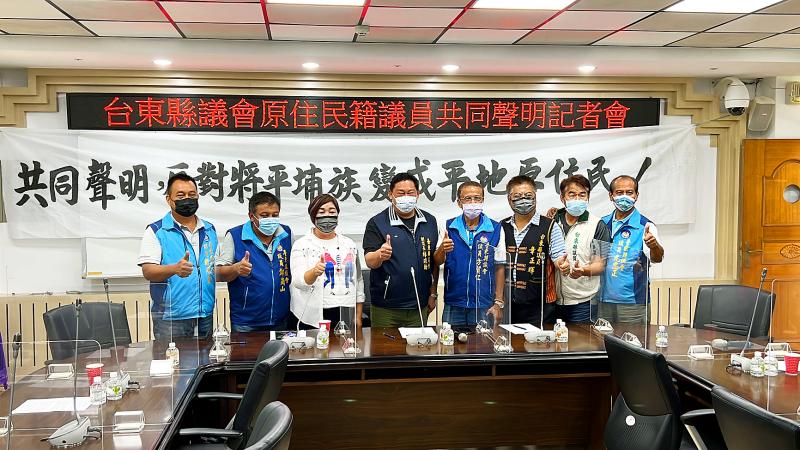Taitung County councilors have opposed the Siraya’s bid to be recognized as “indigenous peoples in plains areas,” as it might accelerate the Sinicization of indigenous people.
The Constitutional Court yesterday heard an oral argument for the case, whereby the Siraya, one of the Pingpu indigenous groups, requested to be recognized legally.
The Status Act for Indigenous Peoples (原住民身分法) does not recognize the Pingpu, who are unable to obtain indigenous status under the existing law.

Photo: CNA
Eight Amis, Paiwan and Puyuma councilors, as well as indigenous people from plains areas and mountainous areas, voiced their disapproval of the appeal in a joint statement issued yesterday.
Taitung County Council Deputy Speaker Lin Tsung-han (林琮翰) said that indigenous people were under legislative protection due to their unique culture, which would be obliterated if Pingpu groups that have already been Sinicized were hastily integrated into the existing categorizations of indigenous people.
The government should enact separate laws to recognize and protect Pingpu groups and establish a Pingpu Council to revive their culture, he said, citing the example of the Hakka Affairs Council.
Pingpu groups should not be included in the “indigenous peoples in plains areas” category, otherwise the lifestyles of existing indigenous peoples would be wiped out and “Taiwan’s indigenous people would soon disappear due to Sinicization,” he added.
Taitung County Councilor Lin Tsan-tien (林參天), who is Han Taiwanese, was highly supportive of recognizing the Pingpu as indigenous people, saying that historically they were “indigenous people’s brothers” so they should not be “left on the street.”
If indigenous people are worried that their resources would be diminished due to recognition of the Pingpu, the government could allocate a larger budget or increase the quota for legislators elected by indigenous peoples in plains areas instead of excluding the Pingpu, Lin Tsan-tien said.
Taking care of minority groups, such as passing the Indigenous Peoples Basic Act (原住民族基本法), can “bring harmony to Taiwan’s politics,” he said, adding that people in Taitung are working hard to improve the relationship between indigenous people and Han Taiwanese.
He called on indigenous people to “accept their brothers the Siraya.”

A preclearance service to facilitate entry for people traveling to select airports in Japan would be available from Thursday next week to Feb. 25 at Taiwan Taoyuan International Airport, Taoyuan International Airport Corp (TIAC) said on Tuesday. The service was first made available to Taiwanese travelers throughout the winter vacation of 2024 and during the Lunar New Year holiday. In addition to flights to the Japanese cities of Hakodate, Asahikawa, Akita, Sendai, Niigata, Okayama, Takamatsu, Kumamoto and Kagoshima, the service would be available to travelers to Kobe and Oita. The service can be accessed by passengers of 15 flight routes operated by

GIVE AND TAKE: Blood demand continues to rise each year, while fewer young donors are available due to the nation’s falling birthrate, a doctor said Blood donors can redeem points earned from donations to obtain limited edition Formosan black bear travel mugs, the Kaohsiung Blood Center said yesterday, as it announced a goal of stocking 20,000 units of blood prior to the Lunar New Year. The last month of the lunar year is National Blood Donation Month, when local centers seek to stockpile blood for use during the Lunar New Year holiday. The blood demand in southern Taiwan — including Tainan and Kaohsiung, as well as Chiayi, Pingtung, Penghu and Taitung counties — is about 2,000 units per day, the center said. The donation campaign aims to boost

ENHANCING EFFICIENCY: The apron can accommodate 16 airplanes overnight at Taoyuan airport while work on the third runway continues, the transport minister said A new temporary overnight parking apron at Taiwan Taoyuan International Airport is to start operating on Friday next week to boost operational efficiency while the third runway is being constructed, the Ministry of Transportation and Communications said yesterday. The apron — one of the crucial projects in the construction of the third runway — can accommodate 16 aircraft overnight at the nation’s largest international airport, Minister of Transportation and Communications Chen Shih-kai (陳世凱) told reporters while inspecting the new facility yesterday morning. Aside from providing the airport operator with greater flexibility in aircraft parking during the third runway construction,

American climber Alex Honnold is to attempt a free climb of Taipei 101 today at 9am, with traffic closures around the skyscraper. To accommodate the climb attempt and filming, the Taipei Department of Transportation said traffic controls would be enforced around the Taipei 101 area. If weather conditions delay the climb, the restrictions would be pushed back to tomorrow. Traffic controls would be in place today from 7am to 11am around the Taipei 101 area, the department said. Songzhi Road would be fully closed in both directions between Songlian Road and Xinyi Road Sec 5, it said, adding that bidirectional traffic controls would